March is Women’s History Month. During this time, we aim to celebrate and recognize women’s achievements in history, raise awareness against bias, and take action for equality.
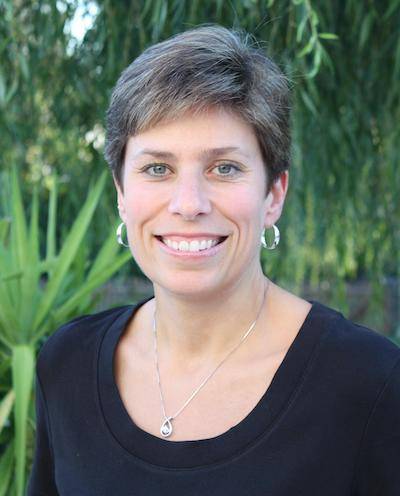
Dr. Anne Cockerham
This month Frontier Nursing University (FNU) will highlight a few female leaders at FNU in Q&A style blogs. The first person we want to spotlight is Dr. Anne Cockerham, PhD, CNM, WHNP-BC, CNE, FACNM, FNU Professor and Course Coordinator, whose scholarly focus is on nursing history.
Jump to Q&A
Both midwifery and nursing are professions in which women have been at the forefront, including many women who are associated with the history of FNU.
FNU’s rich history begins with the Frontier Nursing Service (FNS) which resulted in remarkable outcomes as these nurse-midwives served the people of eastern Kentucky. This work drastically reduced maternal and infant mortality, included widespread implementation of extensive public health interventions such as sanitation and vaccinations, and the provision of primary and inpatient health care to thousands of people who previously had little access to care.
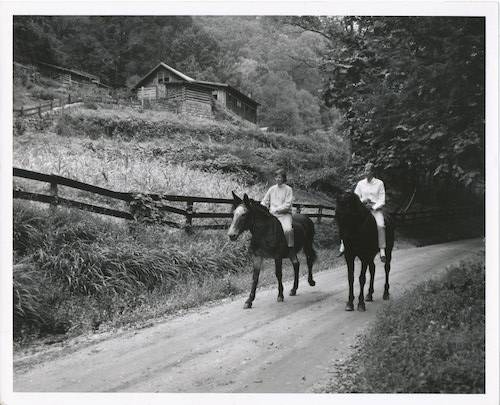 While we want to celebrate the achievements and perseverance of those who pioneered midwifery in the United States, we should also acknowledge and be aware of any wrongdoing and harmful thinking and actions by them.
While we want to celebrate the achievements and perseverance of those who pioneered midwifery in the United States, we should also acknowledge and be aware of any wrongdoing and harmful thinking and actions by them.
“Now, I think the time is right for us to reexamine our history with a careful eye toward identifying any harms that have been done, inequities that have been perpetuated, privilege that has been afforded to some but not all, and opportunities that have been lost,” Dr. Cockerham said. “In other words, I’m glad that historians and those interested in history are moving beyond unquestioning celebration of accomplishments and toward a more nuanced examination of the past.”
Dr. Cockerham believes the most enduring legacy of the FNS is the school that began in 1939 and continues to be in operation today as FNU.
“The large number of well-prepared midwives who come from the FNU program, particularly since the beginning of the distance learning program in 1989, has dramatically increased the nurse-midwifery workforce in the United States,” Dr. Cockerham said. “I’m so proud to be a graduate of the program and now a long-time faculty member!”
To celebrate Women’s History Month, we asked Dr. Cockerham a series of questions in hopes of inspiring and empowering all people to continue to work towards equality and raising awareness of the bias women face or have faced.
Women’s History Month Q&A with Dr. Cockerham:
- What advice would you give to women in your field (midwifery/nursing/healthcare)?
Midwifery and nursing are dominated by women so I think it’s particularly important to seek out, respect, and celebrate differences. Diversity of all kinds enriches us and can make midwifery and nursing even stronger.
- Tell us about a woman you look up to and why.
There are so many folks who are so inspiring that it’s difficult to choose just one. But one woman who comes immediately to mind is Angela Smith, the Executive Director of the Accreditation Commission for Midwifery Education (ACME). I serve as the ACME chairperson, so I have the great privilege of watching Angela’s work up close. She started in the ACME Executive Director role in the early days of the COVID-19 pandemic, and she has gracefully and skillfully navigated the many challenges ACME has faced (along with the rest of the world). Angela is the epitome of equanimity. She is unfailingly professional and utterly unflappable. She is kind, caring, and optimistic, yet realistic. She builds collegial relationships and always keeps her eye on the long-term plan. I learn from her every day and I’m so grateful to work with her.
- Do you have a favorite quote about female empowerment or from a female influencer?
In my role as a teacher, I find Dr. Cate Denial’s work to be powerful. Although I have always gravitated toward a certain approach to teaching, Dr. Denial’s description of the Pedagogy of Kindness has helped me put words to what is in my heart as a teacher. Here’s a quote from Dr. Denial:
Kindness as pedagogical practice is not about sacrificing myself, or about taking on more emotional labor. It has simplified my teaching, not complicated it…I’ve found that kindness as pedagogical practice distills down to two simple things: believing people, and believing in people…A pedagogy of kindness asks us to apply compassion in every situation we can, and not to default to suspicion or anger. When suspicion or anger is our first response, a pedagogy of kindness asks us to step back and do the reflective work of asking why we’re reacting in that manner.
- Is there anything else you would like to share to empower women or encourage people to create change that positively impacts women?
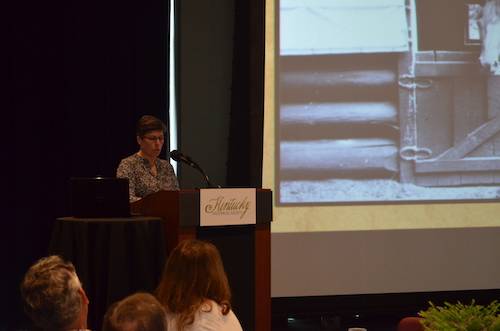 In our work as midwives, WHNPs, and educators, I think one of our most important goals should be to work to make pregnancy, birth, and the postpartum period safe for ALL birthing people. This work includes being humble and listening to members of communities that have been historically marginalized. It includes welcoming folks into the profession who represent the communities they serve, and then humbly asking how we can support their success. It includes acknowledging and mitigating the harms that we have perpetuated on individuals and communities. It includes learning and learning some more, until all birthing folks are safe and satisfied with their care.
In our work as midwives, WHNPs, and educators, I think one of our most important goals should be to work to make pregnancy, birth, and the postpartum period safe for ALL birthing people. This work includes being humble and listening to members of communities that have been historically marginalized. It includes welcoming folks into the profession who represent the communities they serve, and then humbly asking how we can support their success. It includes acknowledging and mitigating the harms that we have perpetuated on individuals and communities. It includes learning and learning some more, until all birthing folks are safe and satisfied with their care.
We thank Dr. Cockerham for her work in midwifery, education and nursing history. Dr. Cockerham is an FNU alumni (CNEP class 27, graduated in 2001) and has been a faculty member since 2009. She has cared for patients in private midwifery and midwifery and physician practices, a military hospital, Planned Parenthood, and a Free Clinic.
Dr. Cockerham is the author of two award-winning books that celebrate the history of the Frontier Nursing Service: Rooted in the Mountains, Reaching to the World: Stories of Nursing and Midwifery at Kentucky’s Frontier School, 1939-1989, published in 2012, and Unbridled Service: Growing Up and Giving Back as a Frontier Nursing Service Courier, 1928-2010, published in 2014.
Subscribe to our blog to be the first to know when our other blogs in our Women’s History Month series are released! Follow us on social media as we highlight women in history all month long.
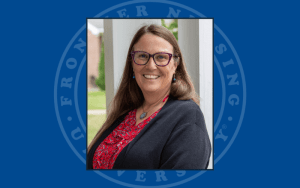
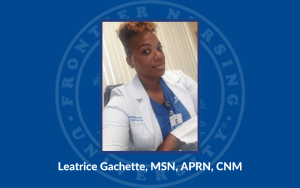
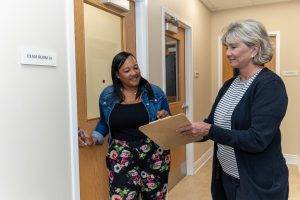



















 Carrie Belin is an experienced board-certified Family Nurse Practitioner and a graduate of the Johns Hopkins DNP program, Johns Hopkins Bloomberg School of Public Health, Georgetown University School of Nursing, and Johns Hopkins School of Nursing. She has also completed fellowships at Georgetown and the University of California Irvine.
Carrie Belin is an experienced board-certified Family Nurse Practitioner and a graduate of the Johns Hopkins DNP program, Johns Hopkins Bloomberg School of Public Health, Georgetown University School of Nursing, and Johns Hopkins School of Nursing. She has also completed fellowships at Georgetown and the University of California Irvine. Angie has been a full-scope midwife since 2009. She has experience in various birth settings including home, hospital, and birth centers. She is committed to integrating the midwifery model of care in the US. She completed her master’s degree in nurse-midwifery at Frontier Nursing University (FNU) and her Doctorate at Johns Hopkins University. She currently serves as the midwifery clinical faculty at FNU. Angie is motivated by the desire to improve the quality of healthcare and has led quality improvement projects on skin-to-skin implementation, labor induction, and improving transfer of care practices between hospital and community midwives. In 2017, she created a short film on skin-to-skin called
Angie has been a full-scope midwife since 2009. She has experience in various birth settings including home, hospital, and birth centers. She is committed to integrating the midwifery model of care in the US. She completed her master’s degree in nurse-midwifery at Frontier Nursing University (FNU) and her Doctorate at Johns Hopkins University. She currently serves as the midwifery clinical faculty at FNU. Angie is motivated by the desire to improve the quality of healthcare and has led quality improvement projects on skin-to-skin implementation, labor induction, and improving transfer of care practices between hospital and community midwives. In 2017, she created a short film on skin-to-skin called 










 Justin C. Daily, BSN, RN, has ten years of experience in nursing. At the start of his nursing career, Justin worked as a floor nurse on the oncology floor at St. Francis. He then spent two years as the Director of Nursing in a small rural Kansas hospital before returning to St. Francis and the oncology unit. He has been in his current position as the Chemo Nurse Educator for the past four years. He earned an Associate in Nurse from Hutchinson Community College and a Bachelor of Science in Nursing from Bethel College.
Justin C. Daily, BSN, RN, has ten years of experience in nursing. At the start of his nursing career, Justin worked as a floor nurse on the oncology floor at St. Francis. He then spent two years as the Director of Nursing in a small rural Kansas hospital before returning to St. Francis and the oncology unit. He has been in his current position as the Chemo Nurse Educator for the past four years. He earned an Associate in Nurse from Hutchinson Community College and a Bachelor of Science in Nursing from Bethel College. Brandy Jackson serves as the Director of Undergraduate Nursing Programs and Assistant Educator at Wichita State University and Co-Director of Access in Nursing. Brandy is a seasoned educator with over 15 years of experience. Before entering academia, Brandy served in Hospital-based leadership and Critical Care Staff nurse roles. Brandy is passionate about equity in nursing education with a focus on individuals with disabilities. Her current research interests include accommodations of nursing students with disabilities in clinical learning environments and breaking down barriers for historically unrepresented individuals to enter the nursing profession. Brandy is also actively engaged in Interprofessional Education development, creating IPE opportunities for faculty and students at Wichita State. Brandy is an active member of Wichita Women for Good and Soroptimist, with the goal to empower women and girls. Brandy is a TeamSTEPPS master trainer. She received the DASIY Award for Extraordinary Nursing Faculty in 2019 at Wichita State University.
Brandy Jackson serves as the Director of Undergraduate Nursing Programs and Assistant Educator at Wichita State University and Co-Director of Access in Nursing. Brandy is a seasoned educator with over 15 years of experience. Before entering academia, Brandy served in Hospital-based leadership and Critical Care Staff nurse roles. Brandy is passionate about equity in nursing education with a focus on individuals with disabilities. Her current research interests include accommodations of nursing students with disabilities in clinical learning environments and breaking down barriers for historically unrepresented individuals to enter the nursing profession. Brandy is also actively engaged in Interprofessional Education development, creating IPE opportunities for faculty and students at Wichita State. Brandy is an active member of Wichita Women for Good and Soroptimist, with the goal to empower women and girls. Brandy is a TeamSTEPPS master trainer. She received the DASIY Award for Extraordinary Nursing Faculty in 2019 at Wichita State University.  Dr. Sabrina Ali Jamal-Eddine is an Arab-disabled queer woman of color with a PhD in Nursing and an interdisciplinary certificate in Disability Ethics from the University of Illinois Chicago (UIC). Dr. Jamal-Eddine’s doctoral research explored spoken word poetry as a form of critical narrative pedagogy to educate nursing students about disability, ableism, and disability justice. Dr. Jamal-Eddine now serves as a Postdoctoral Research Associate in UIC’s Department of Disability and Human Development and serves on the Board of Directors of the National Organization of Nurses with Disabilities (NOND). During her doctoral program, Sabrina served as a Summer Fellow at a residential National Endowment of the Humanities (NEH) Summer Institute at Arizona State University (2023), a summer fellow at Andrew W. Mellon’s National Humanities Without Walls program at University of Michigan (2022), a Summer Research Fellow at UC Berkeley’s Othering & Belonging Institute (2021), and an Illinois Leadership Education in Neurodevelopmental and related Disabilities (LEND) trainee (2019-2020).
Dr. Sabrina Ali Jamal-Eddine is an Arab-disabled queer woman of color with a PhD in Nursing and an interdisciplinary certificate in Disability Ethics from the University of Illinois Chicago (UIC). Dr. Jamal-Eddine’s doctoral research explored spoken word poetry as a form of critical narrative pedagogy to educate nursing students about disability, ableism, and disability justice. Dr. Jamal-Eddine now serves as a Postdoctoral Research Associate in UIC’s Department of Disability and Human Development and serves on the Board of Directors of the National Organization of Nurses with Disabilities (NOND). During her doctoral program, Sabrina served as a Summer Fellow at a residential National Endowment of the Humanities (NEH) Summer Institute at Arizona State University (2023), a summer fellow at Andrew W. Mellon’s National Humanities Without Walls program at University of Michigan (2022), a Summer Research Fellow at UC Berkeley’s Othering & Belonging Institute (2021), and an Illinois Leadership Education in Neurodevelopmental and related Disabilities (LEND) trainee (2019-2020). Vanessa Cameron works for Vanderbilt University Medical Center in Nursing Education & Professional Development. She is also attending George Washington University and progressing towards a PhD in Nursing with an emphasis on ableism in nursing. After becoming disabled in April 2021, Vanessa’s worldview and perspective changed, and a recognition of the ableism present within healthcare and within the culture of nursing was apparent. She has been working since that time to provide educational foundations for nurses about disability and ableism, provide support for fellow disabled nursing colleagues, and advocate for the disabled community within healthcare settings to reduce disparities.
Vanessa Cameron works for Vanderbilt University Medical Center in Nursing Education & Professional Development. She is also attending George Washington University and progressing towards a PhD in Nursing with an emphasis on ableism in nursing. After becoming disabled in April 2021, Vanessa’s worldview and perspective changed, and a recognition of the ableism present within healthcare and within the culture of nursing was apparent. She has been working since that time to provide educational foundations for nurses about disability and ableism, provide support for fellow disabled nursing colleagues, and advocate for the disabled community within healthcare settings to reduce disparities. Dr. Lucinda Canty is a certified nurse-midwife, Associate Professor of Nursing, and Director of the Seedworks Health Equity in Nursing Program at the University of Massachusetts Amherst. She earned a bachelor’s degree in nursing from Columbia University, a master’s degree from Yale University, specializing in nurse-midwifery, and a PhD from the University of Connecticut. Dr. Canty has provided reproductive health care for over 29 years. Her research interests include the prevention of maternal mortality and severe maternal morbidity, reducing racial and ethnic health disparities in reproductive health, promoting diversity in nursing, and eliminating racism in nursing and midwifery.
Dr. Lucinda Canty is a certified nurse-midwife, Associate Professor of Nursing, and Director of the Seedworks Health Equity in Nursing Program at the University of Massachusetts Amherst. She earned a bachelor’s degree in nursing from Columbia University, a master’s degree from Yale University, specializing in nurse-midwifery, and a PhD from the University of Connecticut. Dr. Canty has provided reproductive health care for over 29 years. Her research interests include the prevention of maternal mortality and severe maternal morbidity, reducing racial and ethnic health disparities in reproductive health, promoting diversity in nursing, and eliminating racism in nursing and midwifery. Dr. Lisa Meeks is a distinguished scholar and leader whose unwavering commitment to inclusivity and excellence has significantly influenced the landscape of health professions education and accessibility. She is the founder and executive director of the DocsWithDisabilities Initiative and holds appointments as an Associate Professor in the Departments of Learning Health Sciences and Family Medicine at the University of Michigan.
Dr. Lisa Meeks is a distinguished scholar and leader whose unwavering commitment to inclusivity and excellence has significantly influenced the landscape of health professions education and accessibility. She is the founder and executive director of the DocsWithDisabilities Initiative and holds appointments as an Associate Professor in the Departments of Learning Health Sciences and Family Medicine at the University of Michigan. Dr. Nikia Grayson, DNP, MSN, MPH, MA, CNM, FNP-C, FACNM (she/her) is a trailblazing force in reproductive justice, blending her expertise as a public health activist, anthropologist, and family nurse-midwife to champion the rights and health of underserved communities. Graduating with distinction from Howard University, Nikia holds a bachelor’s degree in communications and a master’s degree in public health. Her academic journey also led her to the University of Memphis, where she earned a master’s in medical anthropology, and the University of Tennessee, where she achieved both a master’s in nursing and a doctorate in nursing practice. Complementing her extensive education, she completed a post-master’s certificate in midwifery at Frontier Nursing University.
Dr. Nikia Grayson, DNP, MSN, MPH, MA, CNM, FNP-C, FACNM (she/her) is a trailblazing force in reproductive justice, blending her expertise as a public health activist, anthropologist, and family nurse-midwife to champion the rights and health of underserved communities. Graduating with distinction from Howard University, Nikia holds a bachelor’s degree in communications and a master’s degree in public health. Her academic journey also led her to the University of Memphis, where she earned a master’s in medical anthropology, and the University of Tennessee, where she achieved both a master’s in nursing and a doctorate in nursing practice. Complementing her extensive education, she completed a post-master’s certificate in midwifery at Frontier Nursing University.









 Dr. Tia Brown McNair is the Vice President in the Office of Diversity, Equity, and Student Success and Executive Director for the Truth, Racial Healing, and Transformation (TRHT) Campus Centers at the American Association of Colleges and Universities (AAC&U) in Washington, DC. She oversees both funded projects and AAC&U’s continuing programs on equity, inclusive excellence, high-impact practices, and student success. McNair directs AAC&U’s Summer Institutes on High-Impact Practices and Student Success, and TRHT Campus Centers and serves as the project director for several AAC&U initiatives, including the development of a TRHT-focused campus climate toolkit. She is the lead author of From Equity Talk to Equity Walk: Expanding Practitioner Knowledge for Racial Justice in Higher Education (January 2020) and Becoming a Student-Ready College: A New Culture of Leadership for Student Success (July 2016 and August 2022 Second edition).
Dr. Tia Brown McNair is the Vice President in the Office of Diversity, Equity, and Student Success and Executive Director for the Truth, Racial Healing, and Transformation (TRHT) Campus Centers at the American Association of Colleges and Universities (AAC&U) in Washington, DC. She oversees both funded projects and AAC&U’s continuing programs on equity, inclusive excellence, high-impact practices, and student success. McNair directs AAC&U’s Summer Institutes on High-Impact Practices and Student Success, and TRHT Campus Centers and serves as the project director for several AAC&U initiatives, including the development of a TRHT-focused campus climate toolkit. She is the lead author of From Equity Talk to Equity Walk: Expanding Practitioner Knowledge for Racial Justice in Higher Education (January 2020) and Becoming a Student-Ready College: A New Culture of Leadership for Student Success (July 2016 and August 2022 Second edition).